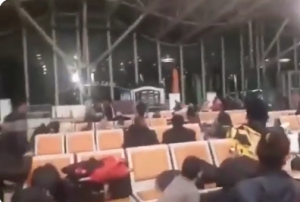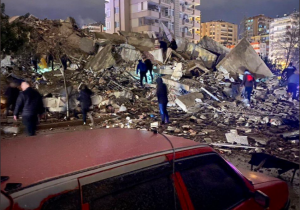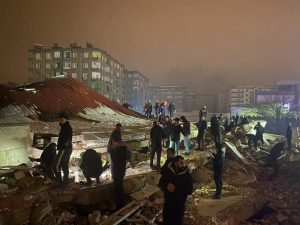Lebanon on Tuesday marked a week since its worst ever peacetime disaster with a mix of grief and rage, as survivors remembered the dead and protesters vowed to bring down the political elite.
The resignation of Lebanon’s government the previous day did little to extinguish the anger caused by the August 4 blast at Beirut port that killed 171 people and disfigured the country’s capital.
At 6:08 pm in Beirut (1508 GMT), church bells rang and mosques called for prayer at the precise moment that a fire, which had spread to a massive stockpile of chemicals, sparked an impossibly powerful explosion that was felt as far away as Cyprus.
The fireball and subsequent shockwave, caught in dramatic videos posted on social media, wrought devastation across entire neighbourhoods of Beirut.
A week later, the blast that left 6,000 people injured and made an estimated 300,000 people temporarily homeless looked like a potential watershed in Lebanon’s troubled political history.
On Tuesday, Ali Noureddin joined thousands of people to march solemnly by the wreckage of Beirut port, where his brother Ayman had been stationed as soldier when the blast engulfed the entire area.
“My brother died because of state negligence and corruption,” he said, holding a picture of his late brother, who had been 27. Ali dismissed the resignation of Hassan Diab’s government on Monday as insignificant unless it were followed by the wholesale removal of Lebanon’s hereditary political elite.
“Change will only happen when the entire regime changes,” he said, holding back tears. “But I hope all these young people here and my brother’s death can bring about change.”In his resignation speech, the 61-year-old Diab sought to cast himself as a champion of the struggle against corrupt political overlords, despite the fact many Lebanese see him as the elite’s puppet rather than its victim.
Some saw his departure as a victory for the protest movement that already forced out the previous government last year. But others warned that given the power of Lebanon’s factions and family clans, the same old faces may be back before too long.
“It’s a long fight that won’t end in a month or two,” said Hussein El Achi, an activist and lawyer defending the resurgent protest camp.,”But (the political elite) are weak, they have never been weaker, even among their own people,” he said. The blast rocked a country already on its knees, having defaulted on its massive sovereign debt and seen poverty rise to near third world levels.
Some observers argue that the massive extra burden and the deep popular anger over the tragedy will reduce Lebanese politicians’ room for manoeuvre as they also face pressure to pass reforms as a condition for foreign assistance.
“They will find it very difficult to avoid the kind of structural reforms that the international community has made a precondition for any aid,” said political science professor Bassel Salloukh of the Lebanese American University.
France has taken the lead in the international emergency response, organising an aid conference chaired by President Emmanuel Macron which raised a quarter of a million euros.
Macron visited blast-ravaged neighbourhoods of Beirut two days after the disaster and adopted a tough tone with the Lebanese leaders he met, warning that they needed to strike “a revamped pact with the Lebanese people”.
For now Diab’s team will continue in a caretaker capacity, as Lebanon faces some of its darkest hours, but negotiations were underway for a successor.
According to the Al-Akhbar daily newspaper, veteran diplomat Nawaf Salam is favoured by Paris, Washington and Riyadh, three of the key outside power brokers in Lebanon.
Iran, sponsor of Lebanon’s dominant Hezbollah movement, also appeared to be on board with such a scenario, which would see Salam head up a neutral government not hostile to the Shiite group. It was not clear how other factions viewed that solution.
The 66-year-old Salam was Lebanon’s ambassador to the United Nations for a decade before serving a term as a judge on the UN-backed International Court of Justice. In the blast zone, the increasingly hopeless search for survivors continued but rescue teams were only pulling bodies out of the rubble.
The blast ripped the side off towering grain silos that shielded part of the city from the shockwave but spilt thousands of tonnes of grain, vital to the import-dependant country’s food security.
Standing next to a UN cargo plane Monday, the head of the World Food Programme said Lebanon needed all the help it could get because 85 percent of Lebanon’s food used to come in through the port.
“You are literally looking at a catastrophe in the making right now if we don’t get the food moving and this port operational,” David Beasley said.
He warned that unless port operations resumed quickly, Lebanon would be without bread in two weeks.






